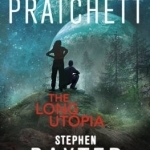The Long Utopia
BookThis item doesn’t have any media yet
2016 | Fiction & Poetry
2045-2059. After the cataclysmic upheavals of Step Day and the Yellowstone eruption humanity is spreading further into the Long Earth, and society, on a battered Datum Earth and beyond, continues to evolve. Now an elderly and cantankerous AI, Lobsang lives in disguise with Agnes in an exotic, far-distant world. He's convinced they're leading a normal life in New Springfield - they even adopt a child - but it seems they have been guided there for a reason. As rumours of strange sightings and hauntings proliferate, it becomes clear that something is very awry with this particular world. Millions of steps away, Joshua is on a personal journey of discovery: learning about the father he never knew and a secret family history. But then he receives a summons from New Springfield. Lobsang now understands the enormity of what's taking place beneath the surface of his earth - a threat to all the worlds of the Long Earth. To counter this threat will require the combined efforts of humankind, machine and the super-intelligent Next. And some must make the ultimate sacrifice...
Related Items:
| Published by | Transworld Publishers Ltd |
| Edition | Unknown |
| ISBN | 9780552169363 |
| Language | N/A |
Images And Data Courtesy Of: Transworld Publishers Ltd.
This content (including text, images, videos and other media) is published and used in accordance
with Fair Use.
| 9-10 |
|
0.0% (0) | |
| 7-8 |
|
0.0% (0) | |
| 5-6 |
|
0.0% (0) | |
| 3-4 |
|
100.0% (1) | |
| 1-2 |
|
0.0% (0) |
